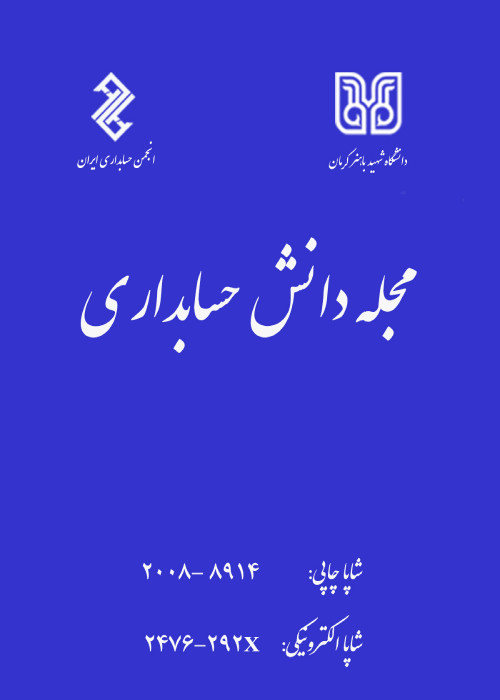A Review of Releaton between Professional Skepticism, Client-Specific Experiences, and Audit Judgments
The main purpose of this study is to investigate the relationship between professional skepticism and client-specific experience in the auditor's judgment. This study examines the auditor's judgment in several stages of the decision-making process to determine the relationship between each stage. If different levels of auditor professional skepticism (more or less professional skepticism) and client-specific experience (positive, negative, and no experience) affect audit judgments. Prior experience of the client could be due to a positive experience related to the positive characteristics of the client; also it could be a negative experience of the client so that the auditor has a negative view of the client. If the auditor has a negative experience with the client, they may consider the client to be unreliable and this experience may be effective in the auditor's judgment.
The present study tries to evaluate the effect of independent variables (professional skepticism and client-specific experience) on the dependent variable (auditor judgment) using the experimental method of 2×3.The population of the study is people working in auditing firms including Assistant Auditor, Auditor, senior auditors, and Supervisor so the data sample of this paper is 155 auditors who were selected by random sampling method.In this study, an experimental method was applied to measure the professional skepticism, previous client-specific experience, and the extent of their professional judgment. The research method consists of three parts. The first part is the Hurt model (2010) to measure professional skepticism (including 30 questions). After that, individuals are classified into two categories with high professional skepticism and low professional skepticism. The second part is related to the previous client specific, which provides information about the hypothetical client. Here, the sample auditor is divided into three groups, then the first group is given a positive experience, the second group is given a negative experience about the client and the third group as a control group is provided with no information about the client. In this section, people are manipulated based on the positive and negative experiences of the client to evaluate the auditor's judgment.
In the same situation, People make different judgments and decisions based on their level of professional skepticism. The previous client-specific experience as another variable could affect the level of the auditor's skepticism, judgments, and decisions. In the present study, three indicators of positive experience, negative experience, and control group are used to measure the cognition of the client, and the variable of fraud/error expectations is applied to measure the auditor's judgment. The results of this study showed that the auditor's decisions and judgments are affected by both the level of skepticism of his profession and the previous client experience. According to the first hypothesis, auditors who have a negative experience with the client are more likely to identify the error as fraud. Compared to auditors with a positive experience of the client.More specifically, a negative experience of the client causes the auditor to find the trustee less trustworthy, which is effective in determining the expectation of fraud/error and ultimately causes the auditor to be more likely to have made the error probably due to fraud rather than an error.The second hypothesis did not confirm that the level of proffesional skepticism of the affects the auditor's judgment and decisions. This finding approves states that the auditor should neither accept the management's claims nor be distrustful of the management's claims and consider the management to be inaccurate.The third hypothesis also states that the difference in auditor's judgment affected by previous experiences was significant for auditors with a low level of professional skepticism (low skepticism). In other words, the previous experience of a client has a greater impact on optimistic people (low-level skepticism versus high-level skepticism). When a person is less skeptical, he is expected to trust people more, so these people are more likely to trust the client's statements when they have a positive experience with the client.
The results of this study showed that the decisions and judgments of the auditor are affected by both the level of skepticism and the client-specific experience. Auditors with low levels of trait skepticism have more trust in the public. Enhancing professional skepticism can be a way to prevent behavioral biases.Therefore, one method of prevent these behavioral biases is to educate and improve the experience of auditors to increase the level of professional skepticism. if auditors are trained, they can be aware of judgment processes and behavioral biases, which can help enhance their level of professional skepticism. The auditor should be aware that despite the confidence in their judgment, there are specific aspects, errors, and biases that can affect the auditor's performance. The findings stated that what the auditor needs to be trained in, is that they need to learn from their previous mistakes and understand why these errors occurred. Because they may understand their role in bias and its impact on the audit process and avoid future mistakes.
- حق عضویت دریافتی صرف حمایت از نشریات عضو و نگهداری، تکمیل و توسعه مگیران میشود.
- پرداخت حق اشتراک و دانلود مقالات اجازه بازنشر آن در سایر رسانههای چاپی و دیجیتال را به کاربر نمیدهد.



